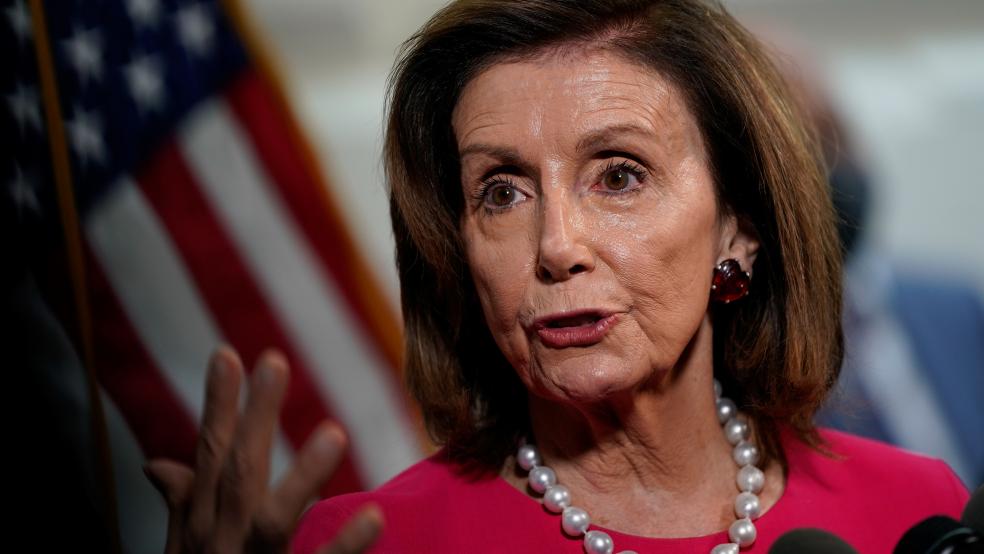A congressional analysis of the Build Back Better bill finds that the tax increases contained within it would raise about $1.5 trillion over a decade, bolstering Democrats’ claim that a major component of President Biden’s social agenda would be paid for with new revenues and would even help shrink the budget deficit.
The estimate from the bipartisan Joint Committee on Taxation examines only the proposed changes to the tax code in the still-developing, $1.8 trillion bill, including the creation of a new minimum tax on large corporations and a surtax on individual incomes over $10 million. Other significant elements, such as additional revenues generated by a beefed-up IRS and savings from reduced drug prices, are not accounted for.
Highlighting the JCT report in a message to colleagues Thursday, House Speaker Nancy Pelosi (D-CA) said that other revenue sources in the Democratic bill would raise an additional $650 billion, pushing the revenue total for the bill over $2 trillion. “It is essential that the legislation is fully paid for and reduces the debt,” Pelosi said.
Pelosi also cited analyses from “the nonpartisan Moody’s Analytics and 17 Nobel Prize-winning economists” that concluded the Democrats’ bill would “grow the economy without increasing inflation, because it is fully paid for.”
Some critics, however, have questioned the projected revenues associated with some parts of the Democratic plan. Enhanced IRS enforcement, for example, is projected to bring in $400 billion over 10 years, though some experts say it would likely bring in far less.
Still, the JCT analysis shows that Democrats’ proposed tax increases are substantial and go a long way toward offsetting the cost of their bill.
What about the gimmicks? Some fiscally conservative Democrats and interest groups have criticized the way the spending plans are structured in the bill, with several key provisions set to expire as part of an effort to keep the long-term cost to a minimum.
At a press conference earlier this week, Sen. Joe Manchin (D-WV) blasted the “shell games” and “budget gimmicks” that he said the bill writers are using to artificially reduce the cost of the bill, while speculating that the true cost was twice what Democrats are citing.
The issue is simple: while the bill shows some new program expiring after two or three years, supporters of those programs expect them to continue, extended by lawmakers in a future Congress. If and when that happens, the budget analysis goes out the window as the cost increases each year a given program is extended. An analysis by the Committee for a Responsible Federal Budget found that extending the programs in the Build Back Better bill could cost an additional $2 trillion.
The use of such gimmicks has a long history. As The New York Times’ Alan Rappeport notes, the Bush tax cuts of 2001 and 2003 were supposed to expire in 2010, but were extended during the Obama administration, with some becoming permanent. Similarly, the individual tax cuts provided by Republicans in 2017 are scheduled to expire in 2025, but could end up getting extended by Congress, increasing the actual cost of the Trump tax bill.
Now the shoe is on the other foot, with Democrats deploying sunsets to lower the price of their bill, and Republicans left to complain about it. On Thursday, the ranking Republican members of Senate committees sent a letter to Senate Majority Leader Chuck Schumer (D-NY) demanding hearings to discuss the spending bill, so to “properly assess what impact a bill will have on the federal budget.”
Waiting on the CBO: While the JCT analysis may mollify some Democratic lawmakers who have concerns about the cost of the Build Back Better bill, others are expected to stick by their demand to see a separate report from the Congressional Budget Office, though it’s not clear if the lack of a CBO score will hold up an expected vote in the House this week.
One Democrat who is expected to demand a CBO score of the bill is Manchin, a key conservative vote who has pushed negotiators to shrink the size and scope of their bill. At the same time, Manchin made it clear that whatever the CBO says, the bill the House may vote on this week will not be the final form of the bill. “I have a lot of concerns, let’s put it that way,” Manchin told Fox News on Wednesday. “They’re working off the House bill. That’s not going to be the bill I work off of.”




